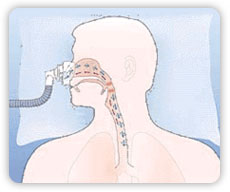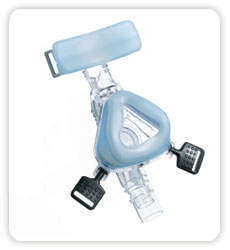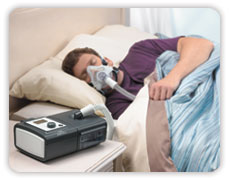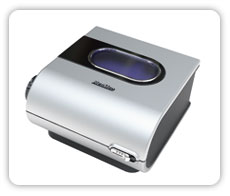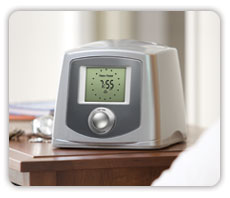CPAP Information
What is CPAP?
Continuous Positive Airway Pressure (CPAP) is the most common and effective treatment for obstructive sleep apnoea. CPAP treats sleep apnoea by providing a gentle flow of positive air pressure through a mask to keep the airways open during sleep.
How does CPAP work?
When CPAP is applied, air is pumped through a mask into your upper airway acting as a splint to hold your airway open so that you can breathe more normally. This prevents the upper airway from collapsing and thus prevents apnoeic events and snoring.

The above diagrams show a side view of a normal airway (2), a collapsed airway as in obstructive sleep apnoea (OSA) (1), and an airway when CPAP is being used (3).
How can CPAP help?
When used properly, CPAP can alleviate the following symptoms caused by sleep apnoea:
- Daytime Sleepiness
- Fatigue
- Morning headaches
- Poor concentration or memory
- Decreased libido or impotence
- Decreased attention
- Depression
- Decreased dexterity
- Personality changes
What are the risks of not treating sleep apnea?
Without treatment, sleep apnoea increases your risk for the following health issues:
- Excessive Daytime Sleepiness (EDS)
- Hypertension
- Stroke—3rd leading cause of death
- 30-50% of stroke victims have mod-severe OSAs
- Angina
- Myocardial Infarction
- Left ventricular failure
- Memory loss/cognitive dysfunction
- Employment difficulties, secondary to EDS
- Social Disharmony, secondary to EDS
- Emotional Disturbances, secondary to EDS
- Related to 1st leading cause of death—coronary heart disease
What happens in a CPAP Trial?
The initial appointment will take approximately 1.5 hours, It is at this appointment that you will trial a number of different masks to find the one that best suites your needs. You will be provided with a mask and machine to take home with you to trial for a period of 4 weeks. Over the course of the next 4 weeks you will have 3 subsequent visits where well-trained staff will monitor your progress, troubleshoot any problems that you may encounter and address any concerns you may have; all to ensure that you get the most out of your treatment.
What happens after my 4 week trial?
At the end of the trial we will have determined the best course of action for your treatment. The sleep staff will then make a recommendation as to your CPAP needs and it will be up to you if you would like to; purchase CPAP equipment, continue to rent the equipment or explore other treatment options if applicable.
Can I purchase CPAP equipment through Sleep Services Australia?
Yes. Once you have received your CPAP prescription, either through the CPAP trial or an in-hospital sleep study, Sleep Services Australia can provide any and all CPAP masks and devices from the following manufactures:

![]()
![]()
Follow up with your referring doctor
You should make a follow up appointment with your referring doctor at the end of the 4 weeks to discuss the results of your CPAP trial.
How often should I get a CPAP check-up?
Once on CPAP you should return once every 6 months to get your mask and machine serviced and to ensure that your treatment is still working appropriately.
It is recommended that a review sleep study be conducted once every 12 months and more often if you have lost or gained a marked amount of weight. *Yearly sleep studies are covered by Medicare.
Questions?
For bookings and enquiries call Sleep Services Australia on 1300 867 533 or contact us with your enquiry.
